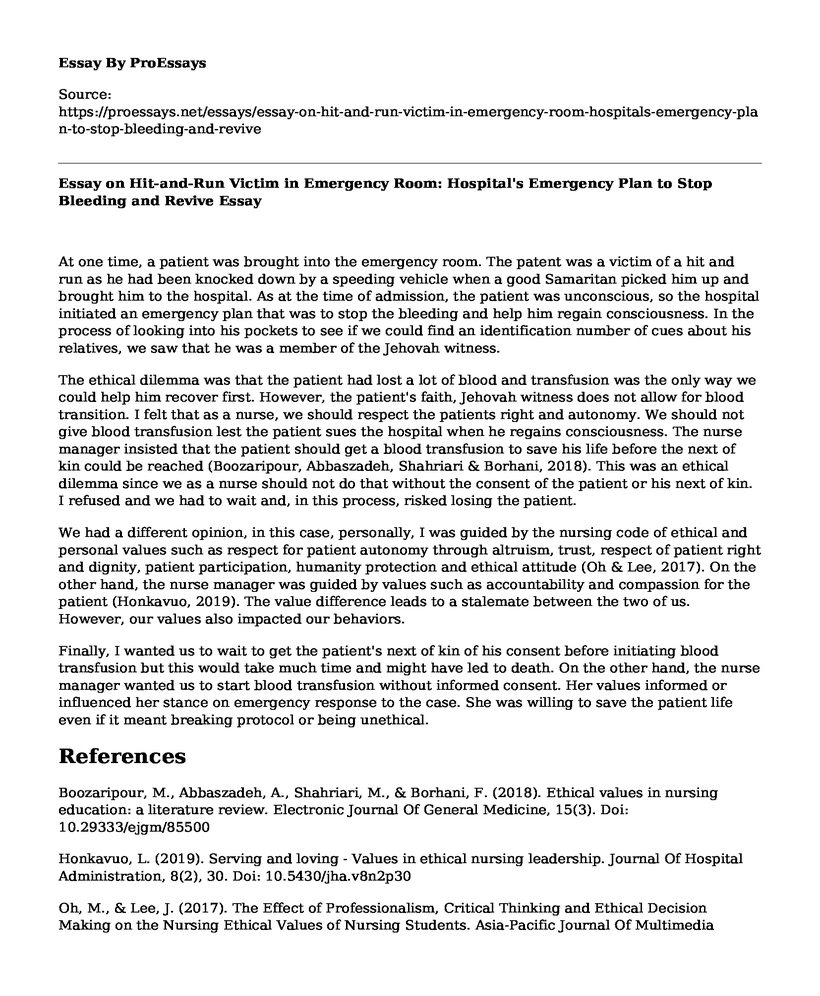At one time, a patient was brought into the emergency room. The patent was a victim of a hit and run as he had been knocked down by a speeding vehicle when a good Samaritan picked him up and brought him to the hospital. As at the time of admission, the patient was unconscious, so the hospital initiated an emergency plan that was to stop the bleeding and help him regain consciousness. In the process of looking into his pockets to see if we could find an identification number of cues about his relatives, we saw that he was a member of the Jehovah witness.
The ethical dilemma was that the patient had lost a lot of blood and transfusion was the only way we could help him recover first. However, the patient's faith, Jehovah witness does not allow for blood transition. I felt that as a nurse, we should respect the patients right and autonomy. We should not give blood transfusion lest the patient sues the hospital when he regains consciousness. The nurse manager insisted that the patient should get a blood transfusion to save his life before the next of kin could be reached (Boozaripour, Abbaszadeh, Shahriari & Borhani, 2018). This was an ethical dilemma since we as a nurse should not do that without the consent of the patient or his next of kin. I refused and we had to wait and, in this process, risked losing the patient.
We had a different opinion, in this case, personally, I was guided by the nursing code of ethical and personal values such as respect for patient autonomy through altruism, trust, respect of patient right and dignity, patient participation, humanity protection and ethical attitude (Oh & Lee, 2017). On the other hand, the nurse manager was guided by values such as accountability and compassion for the patient (Honkavuo, 2019). The value difference leads to a stalemate between the two of us. However, our values also impacted our behaviors.
Finally, I wanted us to wait to get the patient's next of kin of his consent before initiating blood transfusion but this would take much time and might have led to death. On the other hand, the nurse manager wanted us to start blood transfusion without informed consent. Her values informed or influenced her stance on emergency response to the case. She was willing to save the patient life even if it meant breaking protocol or being unethical.
References
Boozaripour, M., Abbaszadeh, A., Shahriari, M., & Borhani, F. (2018). Ethical values in nursing education: a literature review. Electronic Journal Of General Medicine, 15(3). Doi: 10.29333/ejgm/85500
Honkavuo, L. (2019). Serving and loving - Values in ethical nursing leadership. Journal Of Hospital Administration, 8(2), 30. Doi: 10.5430/jha.v8n2p30
Oh, M., & Lee, J. (2017). The Effect of Professionalism, Critical Thinking and Ethical Decision Making on the Nursing Ethical Values of Nursing Students. Asia-Pacific Journal Of Multimedia Services Convergent with Art, Humanities, And Sociology, 7(11), 181-195. Doi: 10.14257/ajmahs.2017.11.14
Cite this page
Essay on Hit-and-Run Victim in Emergency Room: Hospital's Emergency Plan to Stop Bleeding and Revive. (2023, Feb 12). Retrieved from https://proessays.net/essays/essay-on-hit-and-run-victim-in-emergency-room-hospitals-emergency-plan-to-stop-bleeding-and-revive
If you are the original author of this essay and no longer wish to have it published on the ProEssays website, please click below to request its removal:
- Opinion on the Policy of Eliminating Sporting Time
- Mental Health Situation Analysis in Canada
- Nurses and Health Reforms Essay
- Tourette Syndrome Treatment Essay
- History of the FEMA Essay
- Paper Example on Living Healthily with Diabetes: Self-Management Tips
- Nursing Philosophical View: A Holistic Perspective on the 4 Meta Paradigms - Essay Sample







